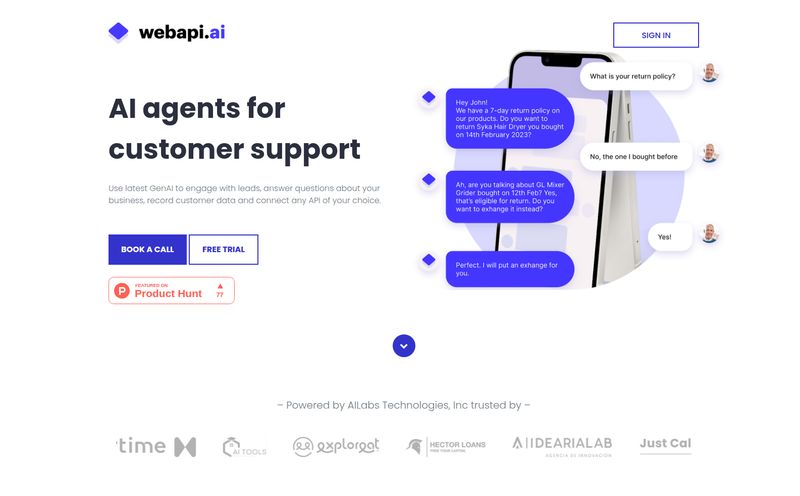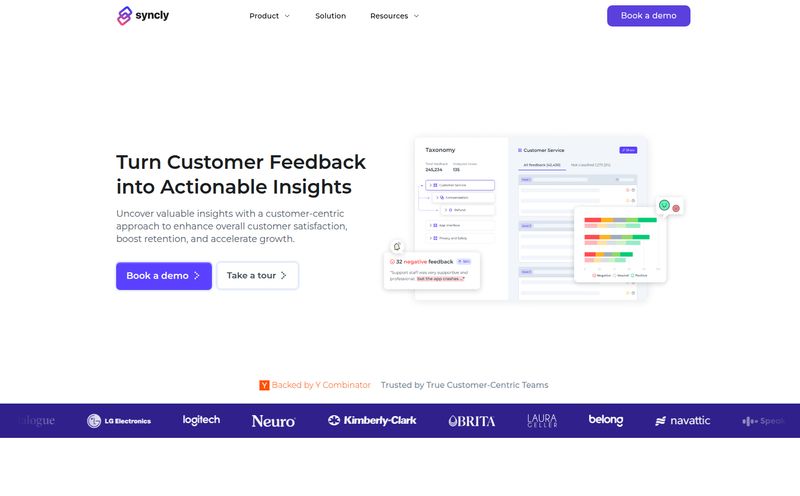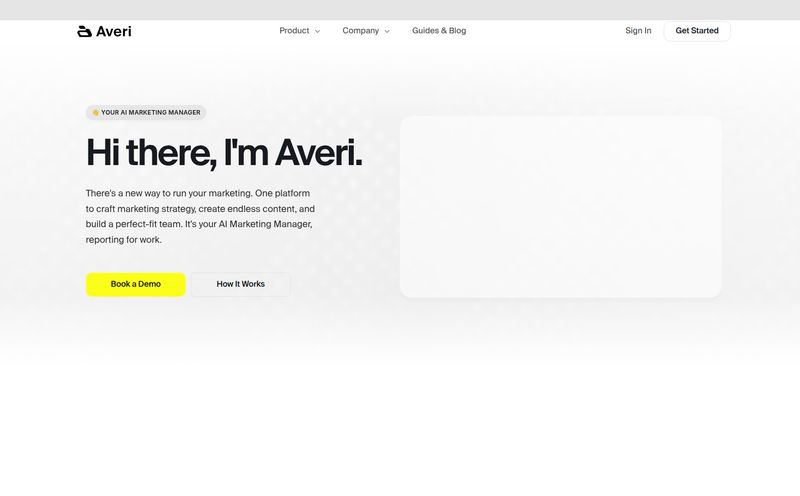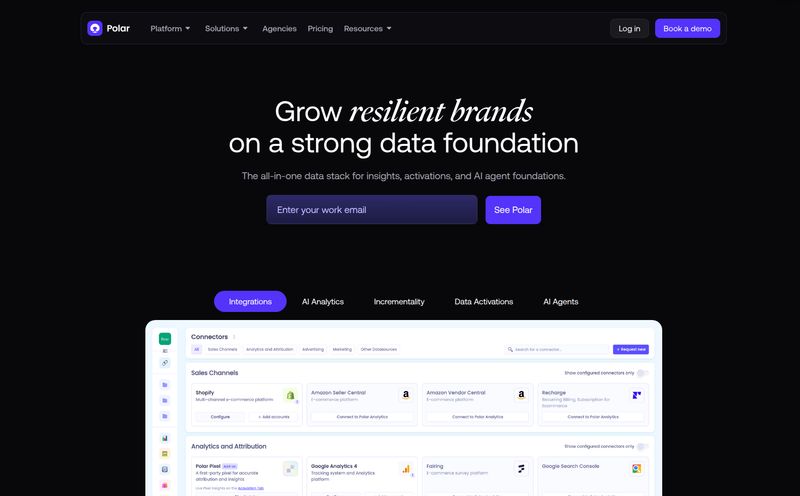If you've ever been in charge of hiring, you know the feeling. It's that slow-drip dread that starts when a critical role opens up. You spend the next few weeks—or months—living on LinkedIn, crafting the perfect Boolean search strings, and scrolling through what feels like an infinite number of profiles. All while the agency fees loom over your head like a dark, expensive cloud. It’s a grind. A necessary one, but a grind nonetheless.
I’ve been in the SEO and traffic generation game for years, and I can tell you that finding the right people is the secret sauce to scaling any business. But the process itself has always felt… archaic. It’s like we’re trying to build futuristic rockets using hand-cranked tools. So when a tool comes along promising to be the “world’s first autonomous sourcer,” my ears perk up. The tool in question is called Noon, and it’s making some seriously bold claims.
But is it just another piece of shiny tech, or is it a genuine shift in how we build teams? Let's get into it.
So, What Exactly is Noon?
In the simplest terms, Noon is an AI-powered talent sourcing platform. But that description feels a little like calling a Ferrari a “four-wheeled vehicle.” It doesn’t quite capture the spirit of the thing. Noon’s entire pitch revolves around the idea of an autonomous system. It’s not just a search tool; it's designed to be a proactive member of your talent team.
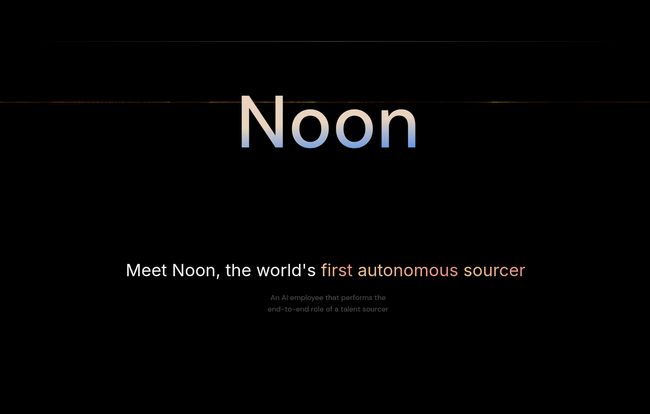
Visit Noon
Think of it this way: traditional recruiting is like fishing with a single rod. You cast your line (a job post), hope for a bite, and maybe you catch a few decent fish. Noon is like having a fleet of self-driving trawlers that are constantly scanning the entire ocean, mapping where the best fish are, and bringing them straight to your dock. It’s built to scale your talent pipeline, completely in-house, without you needing to manually steer every ship.
The platform is aimed squarely at the startup world, especially those “talent-dense” companies that need a steady stream of A-players to keep their momentum going. The promise? To find the perfect candidates for your most difficult roles and save you a fortune in agency fees. A big promise, for sure.
The Promise of an "AI-First" Approach
We’ve all seen “AI” slapped onto software as a marketing buzzword. Usually, it’s just a light dusting of machine learning on an old system. Noon, however, claims to be “AI-first.” What does that mean in practice? It means the AI isn’t an afterthought; it’s the entire engine. It's built from the ground up to understand the nuances of a role, parse through millions of data points, and identify candidates that a human might miss.
This is where it gets interesting for those of us who have hunted for the elusive “purple squirrel”—that perfect candidate with a bizarrely specific set of skills. You know, the Senior DevOps Engineer who also speaks fluent Mandarin and has experience in 18th-century basket weaving. Okay, maybe not that specific, but you get the point. For these hard-to-fill roles, AI’s ability to see patterns across a massive dataset is where it can truly outshine human sourcing. It doesn’t get tired, it doesn't get bored, and it doesn't accidentally overlook a great profile because it's had too much coffee (or not enough).
The Big Question: Does it Actually Save You Money?
Ah, the money. Noon’s marketing materials talk a big game about saving startups “millions of dollars in agency and recruiter fees.” As an SEO guy who lives and breathes ROI, this is where I lean in. Let’s do some quick back-of-the-napkin math. A recruitment agency typically charges between 15% and 25% of the candidate's first-year salary. For a senior engineer making $180,000, that’s a one-time hit of $27,000 to $45,000. Hire a few of those a year, and you’re suddenly looking at six figures spent on just finding people.
Noon’s model shifts this from a transactional expense to an operational one. While they’re a bit quiet about their exact pricing on the website (a classic SaaS strategy to get you on a demo call), it's safe to assume it's a subscription fee. Even a hefty subscription is likely to come out way ahead when you’re scaling aggressively. You’re not just paying for a single hire; you’re investing in a system that builds a continuous, proprietary pipeline of talent. That pipeline becomes a company asset. An agency's contact list is their asset, not yours.
This is a fundamental change in thinking about talent acquisition. It's about building an in-house capability rather than renting it.
Let's Get Real: The Potential Downsides
I’ve been around long enough to know there’s no such thing as a magic bullet. Every powerful tool has its quirks and learning curves. Based on the nature of this tech, there are a couple of things to keep in mind.
The Initial Learning Curve
An autonomous system isn’t a mind-reader. You can't just plug it in and expect miracles on day one. There will be a setup process. You'll need to train it on what you’re looking for, integrate it with your workflow, and teach your team how to interpret its results. It’s an investment of time upfront. For teams already stretched thin, this can be a hurdle. The promise is that this initial effort pays off exponentially down the line, but it's a factor to consider.
Garbage In, Garbage Out
This is the oldest rule in computing, and it applies to AI more than anything. The effectiveness of Noon is going to be directly tied to the quality of the AI's algorithms and, crucially, the quality of the information you give it. If your job descriptions are vague and your ideal candidate profile is a mess, the AI will just be very efficient at finding you the wrong people. It’s a powerful amplifier. So, it amplifies good inputs, but it will also amplify messy ones. Getting your own house in order is a prerequisite.
Who is Noon Actually For?
So, should every company rush out and sign up for Noon? Probably not. I see a pretty clear sweet spot for this kind of platform.
It’s perfect for:
- High-Growth Tech Startups: The obvious one. Companies that need to hire dozens of engineers, product managers, and data scientists yesterday.
- Companies with Niche Roles: If you're constantly hunting for candidates with rare skillsets, an AI sourcer could be a game-changer.
- Businesses Tired of the Agency Treadmill: Any company that has looked at its P&L sheet and gasped at the line item for recruiter fees is a prime candidate.
Conversely, if you’re a small local business that hires maybe one or two people a year, this is likely overkill. It’s a professional-grade tool for a specific, and growing, business need. For those companies, sticking to traditional methods is probably more cost-effective.
To put it simply, here’s how I see the old way stacking up against the Noon way:
| Aspect | The Old Way (Agencies / Manual) | The Noon Way (Autonomous AI) |
|---|---|---|
| Cost Model | Transactional (% of salary per hire) | Subscription (Investment in a system) |
| Pipeline | Owned by the agency; starts fresh each time | In-house asset; continuously builds |
| Effort | High manual effort in sourcing/screening | Upfront setup, then automated sourcing |
| Scalability | Linear; more roles = more cost/time | Exponential; scales effortlessly with demand |
Frequently Asked Questions About Noon
So what is Noon, in a nutshell?
Noon is an AI-powered platform designed to automate the process of talent sourcing. It helps companies build their own in-house pipeline of candidates for hard-to-fill roles, aiming to reduce reliance on expensive recruitment agencies.
How does Noon actually save companies money?
The primary saving comes from avoiding agency fees, which are typically 15-25% of a new hire's salary. By paying a (presumably) fixed subscription fee for Noon, companies can make multiple hires for a fraction of the cost, especially when scaling their team quickly.
Is Noon meant to replace human recruiters?
Not entirely. In my view, it replaces the most time-consuming part of a recruiter's job: the sourcing and initial screening. This frees up human recruiters to focus on what they do best—building relationships, conducting meaningful interviews, and closing candidates. It changes the role from a hunter to a cultivator.
What kind of companies would benefit most from Noon?
Fast-growing startups, tech companies with a constant need for specialized talent, and any organization looking to build a long-term, in-house talent acquisition capability instead of outsourcing it.
How much does Noon cost?
The company doesn't publish its pricing publicly. This is typical for enterprise-level B2B SaaS platforms. You'll likely need to schedule a demo to get a custom quote based on your company's size and needs.
Is it weird to have an AI find your next job for you?
It's a valid question! But AI is already working behind the scenes on platforms like LinkedIn. Noon just brings it to the forefront. The goal isn't to remove human connection but to make it more efficient. An AI finds the potential match, but a human still has to make the connection and see if it's a real fit. I think we will see much more of this in the future.
My Final Thoughts on the Future of Recruting
So, is Noon the revolution it claims to be? I think it’s a massive step in the right direction. For too long, talent acquisition has been a reactive, labor-intensive process. Tools like Noon represent a shift towards a proactive, strategic, and data-driven function.
It's not about firing all your recruiters and letting the robots take over. It’s about giving your talent team a superpower. It allows them to stop spending 80% of their time on the tedious work of sourcing so they can focus on the high-value, human-centric work of engagement and culture-fit. The era of the autonomous sourcer is here, and frankly, it's about time. It might just be the cure for the post-Great Resignation hangover that so many companies are still nursing.
Reference and Sources
- Noon Official Website - The primary source for the platform's features and claims.
- Using AI for Recruiting - An article from SHRM discussing the broader trends of AI in the HR space.
